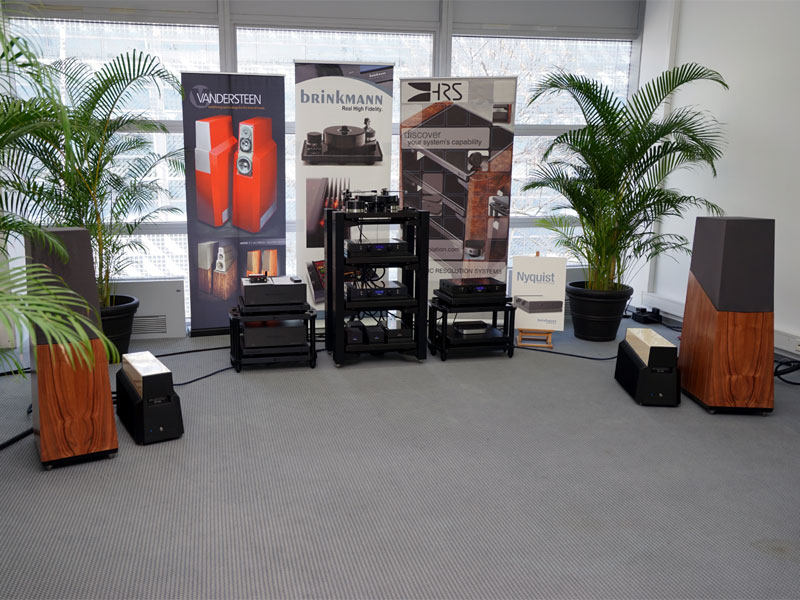High End 2016 • TABlog
long with the rest of the audio press, I’ve been trying -- and failing -- to hear a straight A/B comparison of MQA encoding since the format’s inventors first started trumpeting its virtues. What we have been treated to are endless demonstrations of MQA-encoded material, lengthy expositions on the technicalities of the system, pro-industry endorsements and the amazing “revelation” that for the last 40 years, digital encoding has been screwing with the time domain and temporal coherence of recordings. Did I miss something, or isn’t that exactly what the audiophile community has been telling digital advocates for the same four decades? Along with the “artist sign-off” aspect of the Master Quality Authenticated messaging -- which is rather undermined by the use of demonstration material from deceased performers -- it seemed increasingly like we were going to have to accept the claimed performance benefits on trust. The trouble is that nature abhors a vacuum. Given that a five-minute A/B/A comparison should be both simple to conduct and the point of departure for the whole marketing effort, the increasingly conspicuous avoidance of any such thing has set the conspiracy theorists all of a flutter. Throw in the fact that to date there has been no major-label support for the initiative and you can understand why certain sectors of the audiophile community were starting to cry “Foul!”
Well, Munich marked two significant developments for MQA. Potentially the most important is the announcement of a licensing deal with the massive Warner Music Group. I say "potentially" because the precise terms of that agreement and the shape that it will ultimately take in terms of what material will be available in the MQA format remain to be seen. However, Bob Stuart and the MQA crowd were looking mightily relieved in Munich. Secondly, selected comparison material is finally beginning to appear, along with presentations of such to chosen, “trusted” audiophile journalists. Yes -- that’s right: I’ve finally gotten to hear an MQA versus non-MQA comparison, and the results were really quite impressive. However, that observation requires qualification. Firstly, I’m not sure I’m on any list of “trusted” commentators; I’ve just been increasingly loud in my complaints about the lack of meaningful listening opportunities. After yet another presentation with no comparisons included, I was sufficiently bolshy that I was whisked aside and offered a private comparison -- possibly (probably?) just to shut me up. Secondly, the comparison I heard (along with Dennis Davis) was on headphones and featured an 88.2kHz native master alongside an MQA-encoded version of the same (unfamiliar) material. That (not unreasonably) displays the MQA technology in the best possible scenario, and impressive it certainly was. Whilst the sonic benefits in terms of detail, tonality and overall separation and coherence were plainly apparent, what really impressed was the musicality of the MQA replay. Just like “tune-dems” of old, the mainstay of the Linn/Naim philosophy, the musicians sounded like better players, the group sounded like a better band, but most crucially of all, the vocalist on the MQA file wasn’t just singing -- she was singing to me. For those who bemoan digital’s lack of musical soul, MQA seems like a serious step in the right direction. It’s not unique in that regard. Both the Neodio Origine and Wadax Pre 1 Ultimate (the two finest digital replay systems I’ve experienced) excel in precisely this regard. But what MQA promises is a far wider availability of such performance. In fact, what MQA promises is to finally deliver on that digital dream that dates back four decades: finally delivering superior sound from not just high-end audio systems but the increasing number of basic portable devices in use. For that to happen, of course, the MQA-encoded files have to be available and we all have to invest in the decoding hardware to deal with them. The announcement of the Warner deal is a huge step forward for MQA, but it’s not a home run. The ball only lands over the boundary fence when FMCE giants like Apple and Samsung sign up and start including the technology in their latest offerings -- and that’s way off yet.
In the meantime, MQA has also promised me a home audition
-- one involving MQA-encoded versions of music chosen by me, so I’ll have the CD, the
standard 44.1kHz/16-bit file and the MQA-encoded file for comparison. A rather more
controlled and meaningful exercise that, on the basis of what I’ve already heard,
I’m really rather looking forward to. Unlike one commentator, I can’t say that
MQA is even close to being the most significant development in my audio lifetime, but on
this showing it could just restore mass music listening to a level of pleasurable
performance that the public hasn’t enjoyed since it stopped buying LPs. |


